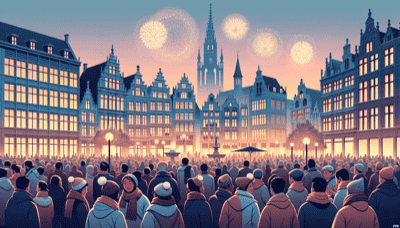We're here to help you keep count of the days to or since a date. Just click the button below and enter your chosen date to get started. Also choose the suggested days or search for a special day above #countingthedays

New Year's Eve, known as "Sint Sylvester Vooravond" or "Oudejaarsavond" in Dutch and "Réveillon de Saint-Sylvestre" in French, marks the end of the old year and the beginning of the new one in Belgium. While not steeped in long-standing indigenous traditions, the celebration incorporates various customs that are a blend of modern practices and some that have been adopted from other cultures.
The evening commemorates Saint Sylvester’s feast day, which is on December 31st. Saint Sylvester was a Pope who served during the 4th century and his feast day coincided with New Year's Eve celebrations after the adoption of the Gregorian Calendar.
Family Gatherings: Many Belgians spend the evening with family or friends at home or at parties. It is an occasion for festive dinners that often include gourmet foods like foie gras, seafood, and traditional sweet treats such as "oliebollen," a type of doughnut.
Public Celebrations: Major cities like Brussels, Antwerp, and Ghent host public celebrations. These typically feature live music, street performers, and countdowns to midnight followed by spectacular fireworks displays.
Toasting: At midnight, Belgians toast to the New Year with glasses of champagne or local beers.
New Year Resolutions: Making resolutions for personal improvement is a common practice among Belgians as it is in many other parts of the world.
Exchange of Wishes: The exchange of "Bonne Année" (Happy New Year) wishes among French speakers or "Gelukkig Nieuwjaar" among Dutch speakers is common after midnight.
New Year’s Day Visits: It's also traditional to visit friends and family on January 1st to offer best wishes for the new year.
Belgians embrace New Year's Eve as a time for joyous celebration, reflection on the past year, and welcoming what lies ahead with hope and festivities.